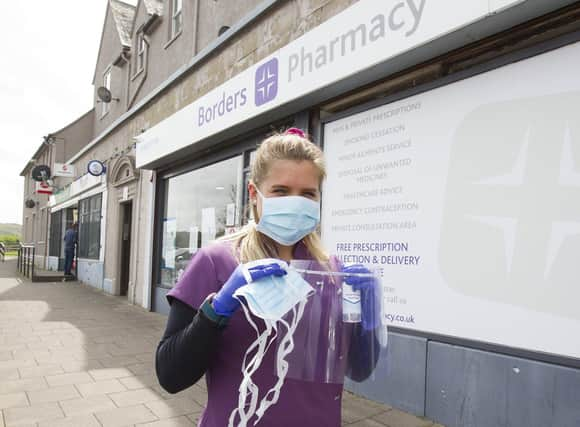Face coverings reduce transmission risk by 90 per cent


Research has found wearing a face covering can reduce the forward distance of an exhaled breath by more than 90 per cent.
As the breath could contain small droplets of water, some of which may contain traces of the virus, experts have said covering up the mouth and nose could help combat Covid-19.
Advertisement
Hide AdAdvertisement
Hide AdScientists testing the effectiveness of seven different types of face coverings, including medical grade and home made masks, said they could all potentially limit the spread of coronavirus.
The Scottish Government advised people on April 28 to wear face coverings when leaving the house and entering enclosed spaces where maintaining social distancing is more difficult, such as on public transport or in supermarkets.
Dr Felicity Mehendale, a surgeon at the Centre for Global Health at the University of Edinburgh’s Usher Institute, said: “It was reassuring to see the handmade mask worked just as well as the surgical mask to stop the wearer’s breath flowing directly forwards.
“This suggests that some handmade masks can help to prevent the wearer from infecting the public.”
Advertisement
Hide AdAdvertisement
Hide AdBut a team lead by engineers at the university found some masks enabled strong jets of air to escape from the back and sides.
Surgical masks and the tested handmade masks were found to limit the forward flow of a breath out but also generate far-reaching leakage jets to the side, behind, above and below.
Heavy breathing and coughing, in particular, were shown to generate intense backward jets.
Only masks that form a tight seal with the face were found to prevent the escape of virus-laden fluid particles, the team said.
Advertisement
Hide AdAdvertisement
Hide AdDr Ignazio Maria Viola, of the University of Edinburgh’s School of Engineering, who co-ordinated the project, said: “I have generally been impressed by the effectiveness of all the face coverings we tested.
“However, we discovered that some face coverings allow the emergence of downward or backward jets that people are not aware of and that could be a major hazard to others around them.”
Dr Mehendale added: “The strong backward jets mean you need to think twice before turning your head if you cough while wearing a mask and be careful if you stand behind or beside someone wearing a mask.”
Last week the UK Government announced that they had agreed a deal with Scottish technology company Honeywell to manufacture 70 million face masks for frontline NHS workers.
Advertisement
Hide AdAdvertisement
Hide AdThe deal, the biggest UK order of its kind, will create 450 new jobs at the production site in Newhouse, North Lanarkshire.
Lothian MSP, Miles Briggs, said: “The use of a face mask to reduce the possible transmission of Covid-19 is apparent and now we have the science to back it up.
“As we move out of lockdown measures such as people using face masks will be vital for keeping the R number down.
“This is a very worthwhile piece of research by the University of Edinburgh on the effectiveness of different face masks.”
Comment Guidelines
National World encourages reader discussion on our stories. User feedback, insights and back-and-forth exchanges add a rich layer of context to reporting. Please review our Community Guidelines before commenting.